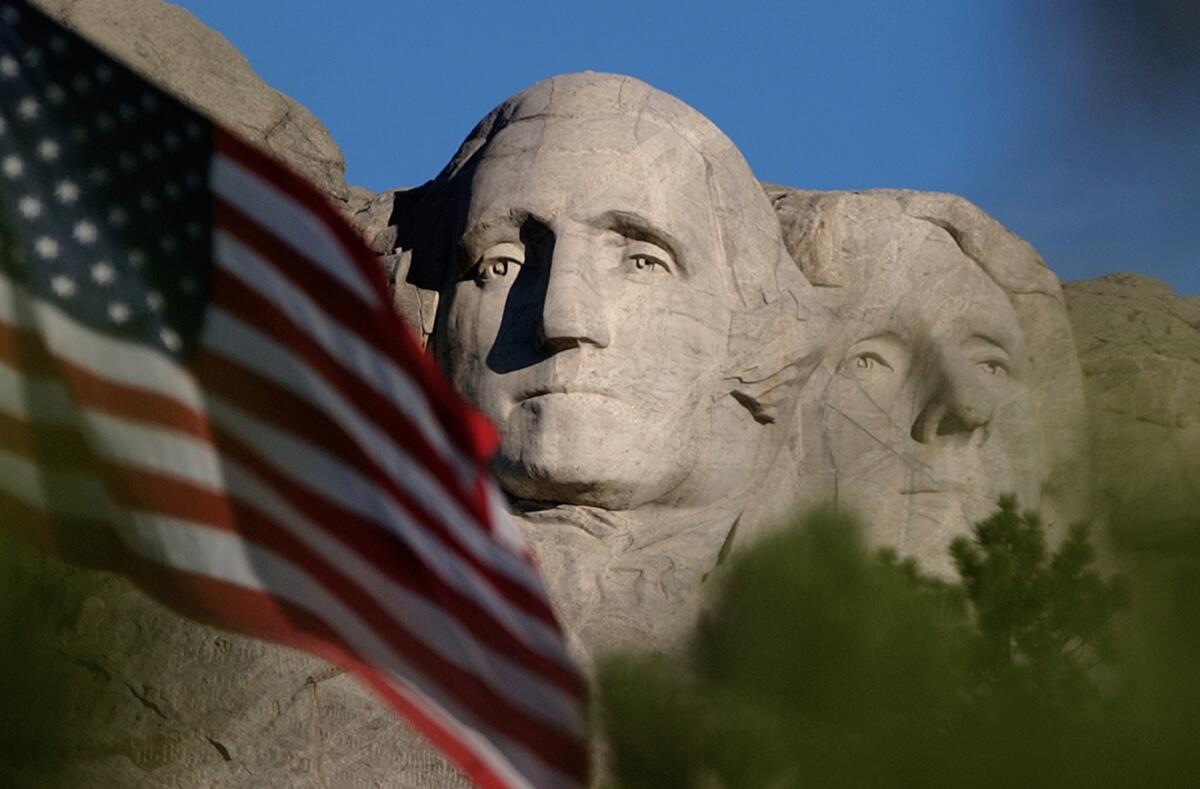Column: Donald Trump flunks American history 101 — again

- Share via
According to President Trump, American history has been hijacked.
The way he tells it, a cabal of radical educators wielding Marxist ideologies like critical race theory and brandishing dog-eared copies of Howard Zinn’s “People’s History of the United States” have captured our schools and universities and are indoctrinating our children to believe that the U.S. is wicked, that Americans are racist and that our country was founded on oppression rather than freedom.
The “rioting and mayhem” in the streets, he says, is the direct result of decades of brainwashing by left-wing teachers bent on making Americans “lose confidence in who we are, where we came from and what we believe.”
But have no fear! Trump is going to reclaim our history from the radicals and the socialists, and fight against the “twisted web of lies” that questions the “virtue of America’s heroes” and the “nobility of the American character.” He’s already issued an executive order to protect statues from “violent mobs incited by a radical fringe.” Now, he said in a speech on Thursday, his administration is supporting the development of a “pro-American curriculum” designed to teach students “the magnificent truth about our country.”
This is vintage Trump. He loves spewing empty patriotic rhetoric. He loves fomenting division and resentment through the culture wars. And he loves portraying the world in the simplest, most reductive terms.
But here’s the thing about history: It’s complicated. It’s nuanced. It’s a tangled web of competing interpretations, clashing facts, alternative perspectives. It is constantly being reconsidered, challenged and revised, and that’s as it should be.
Trump’s notion that the United States is not evil but rather magnificent — and that those are the only two choices worth mentioning — is ludicrously simple-minded. The idea that we need to propagandize our children with a jingoistic “patriotic education” is not only nonsensical, it’s dangerous.
Yes, there are radical historians in the world, and there are also conservative historians. There are political historians and social historians and cultural historians and intellectual historians. There are those who believe in studying history from the bottom up and others who prefer history from the top down. Some historians see the world through the prism of gender, or race, or class, or sexuality. Some study leaders, some study movements, some study nations, some study ideas.
Unsurprisingly, there are those who write about the United States as a consistent force for good and others who are deeply critical of it. That’s because some focus on the long, slow expansion of rights, the broadening of liberal democracy, the growth of a giant middle class, the commitment to political liberty — while others emphasize the evils of slavery, the genocide of the Indigenous population and the centuries-long denial of rights to marginalized people.
History is richer and more complete because of these competing factions.
I came of age reading historians of all political bents. There were those on the left like Herbert Aptheker, those closer to the center like Arthur Schlesinger, and those farther to the right like Robert Conquest. Later I read Eric Foner and Robert Caro and Jill Lepore and Doris Kearns Goodwin and Ron Chernow and Victor Davis Hanson. Together, they have helped me put this country in context by offering new and different ways of looking at the past.
The “pro-American” education Donald Trump advocates is designed to eliminate complexity, ambiguity or contradiction. That is a really bad idea if we hope to understand our great but messy experiment in democracy.
The president is now setting up his “1776 Commission” to replace “toxic propaganda” and “ideological poison” with patriotic education. Here are some principles that could guide him along the way, but which he will surely ignore.
Historians should be intellectually honest, regardless of their political leanings.
Colleges and universities should offer students a broad range of historical opinions, approaches and perspectives. Indoctrination from any single political point of view will not help students become thoughtful critical thinkers who can fulfill their responsibilities in a democratic country.
Historians should study and teach our country’s faults as well as its strengths. To teach that the United States is simply “magnificent” and “the most exceptional nation in the history of the world” would be foolish, dishonest and dangerous.
School curricula should be decided by teachers and academics, not by politicians with axes to grind and elections to win.
Over time, our ongoing national debate about which Americans should be honored — and which should be dislodged from their pedestals — ought to be influenced by the thoughtful insights of the country’s historians.
And, finally, some historian somewhere should tell Donald Trump to stop saying he’s done more for African Americans than any president since — and maybe even including — Abraham Lincoln. I can’t bear to hear it even one more time.
@Nick_Goldberg
More to Read
A cure for the common opinion
Get thought-provoking perspectives with our weekly newsletter.
You may occasionally receive promotional content from the Los Angeles Times.











